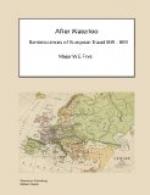’Twas on a fine morning the 16th August that I took my departure from Turin with a vetturino bound to Bologna. I agreed to pay him sixty francs for my place in the coach, supper and bed. When this stipulation for supper and bed is included in the price fixed for your place with the vetturino, you are said to be spesato, and then you have nothing extra to pay for but your breakfast. There were two other travellers in the vettura, both Frenchmen; the one about forty years of age was a Captain of cavalry en retraite, married to a Hungarian lady and settled at Florence, to which place he was returning; the other, a young man of very agreeable manners, settled likewise at Florence, as chief of a manufactory there, returning from Lyons, his native city, whither he had been to see his relations. I never in my life met with two characters so diametrically opposite. The Captain was quite a bourru in his manners, yet he had a sort of dry, sarcastic, satirical humour that was very diverting to those who escaped his lash. Whether he really felt the sentiments he professed, or whether he assumed them for the purpose of chiming in with the times, I cannot say, but he said he rejoiced at the fall of Napoleon. My other companion, however, expressed great regret as his downfall, not so much from a regard for the person of Napoleon, as for the concomitant degradation and conquest of his country, and he spoke of the affairs of France with a great deal of feeling and patriotism.
The Captain seemed to have little or no feeling for anybody but himself; indeed, he laughed at all sentiment and said he did not believe in virtue or disinterestedness. When, among other topics of conversation, the loss the French Army sustained at Waterloo was brought on the tapis, he said, “Eh bien! qu ’importe? dans une seule nuit a Paris on en fabriquera assez pour les remplacer!” A similar sentiment has been attributed to the great Conde.[78] We had a variety of amusing arguments and disputes on the road; the Captain railed at merchants, and said that he did not believe that honor or virtue existed among mercantile people (no compliment, by the bye, to the young fabricant, who bore it, however, with great good humour, contenting himself with now and then giving a few slaps at the military for their rapacity, which mercantile people on the Continent have now and then felt, before the French Revolution, as well as after). The whole road from Turin to Alexandria della Paglia is a fine broad chausee. The first day’s journey brought us to Asti. A rich plain on each side of the road, the horizon on our right bounded by the Appennines, on our left by the Alps, both diverging, formed the landscape. Asti is an ancient, well and solidly built city, but rather gloomy in its appearance. It is remarkable for being the birthplace of Vittorio Alfieri, the celebrated tragic poet, who has excelled all other dramatic poets in the general denouement




